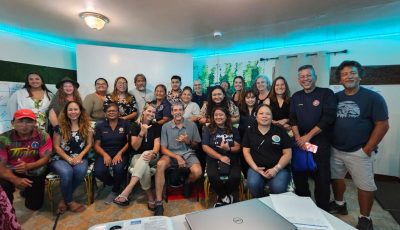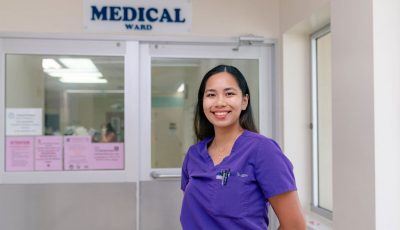House passes bill to give $920K to CHCC dental program, Medicaid local matches
A special “cancer fund” account was zeroed out in an appropriations measure passed by the House of Representatives yesterday in order to move money to aid the local hospital’s dental and Medicaid programs.
That special “cancer fund” was created through a provision in public law last year that gave 3 percent of excise taxes to cancer treatment and programs.
Gov. Eloy S. Inos earmarked a projected $970,000 for fiscal year 2016 for the account. That amount was projected revenue eyed by lawmakers during budget talks over the last several weeks. While withdrawn from the eventual compromise budget bill, it was agreed in “good faith” to introduce the measure in the House.
Rep. Angel Demapan (R-Saipan) introduced the bill and urged for first and final reading yesterday.
The bill, H.B. 19-101, appropriates $520,000 from the cancer fund to support programs of the Commonwealth Healthcare Corp. and the CNMI Medical Referral Services program.
Rep. Antonio Sablan (Ind-Saipan) offered two amendments to the bill, one of which was for $250,000 for Medicaid local matching funds for new federal initiatives that lawmakers said could result in $2.25 million from the federal side, under a 90-to-10 cost-share initiative, according to Demapan.
Demapan said under regular Medicaid program it is 55-to-45 percent cost-share. “This is a great opportunity to really see our money make the most out of the matching fund,” he told reporters after the House passed the bill unanimously to applause from the attending public.
“In order to participate in that program, the government has to be able to match 10 percent. We are matching $250,000 in order to make $2.2 million” for the federal match.
That $2.2 million would go to Medicaid coverage on top of what they already have, Demapan said.
Sablan told reporters his amendment was part of a request by the administration to back a new initiative to support a CNMI match for Medicaid coverage.
“The initiative is to provide improvement to data gathering and information,” Sablan said.
Sablan’s other amendment was to move $200,000 from the account to the Commonwealth Cancer Association.
Margaret Torres Aldan, director of the Department of Public Health, spoke during public comments in support of the bill.
“Why keep the Public Health dental clinic open when there are private clinics that accept Medicaid participants? I will tell you why,” she told lawmakers. “The public health dental clinic is the only dental clinic with school program. These are school programs that provide preventive oral health services including education and follow-up care to our children enrolled in the Head Start program and the elementary schools, including Rota and Tinian.
“Our young adults are dying of oral cancer,” Aldan said in her remarks. “From the cancer registry, there are 25 young adults diagnosed with oral cancer from 2007 to 2014. Out of this 25, twenty-three have expired due to complications of oral cancer.
“…The public health dental clinic is the only clinic that provides dental services to the uninsured. No one is turned away.”
Dr. Adam Gentry, chief dentist for CHCC, said his work at CHCC Dental has been “eye-opening” and urged passage of the bill.
“I’ve seen things that I would have never seen had I worked this position in the States,” he said, noting the state of oral cancer on island.
“…We see almost on a weekly basis the amount of oral cancer that just walks into our door. [These patients] have never been seen by anyone else.”
“Just in the last week, we’ve had four cases that walked into our door,” he added.
“We ask for some of this funding because we serve almost as secondary emergency room for CHCC, because of our close coordination with both pediatrics, with family care clinic, with emergency room, with the women’s clinic. They refer a lot of their patients down to us when it refers to an oral screening especially oral cancer related,” he said.
“We are the last stop for patients before they are referred off-island for care that they couldn’t see here,” he said, referring to general anesthesia for small children that have high need for dental restoration, and special care for both children and adults.



























